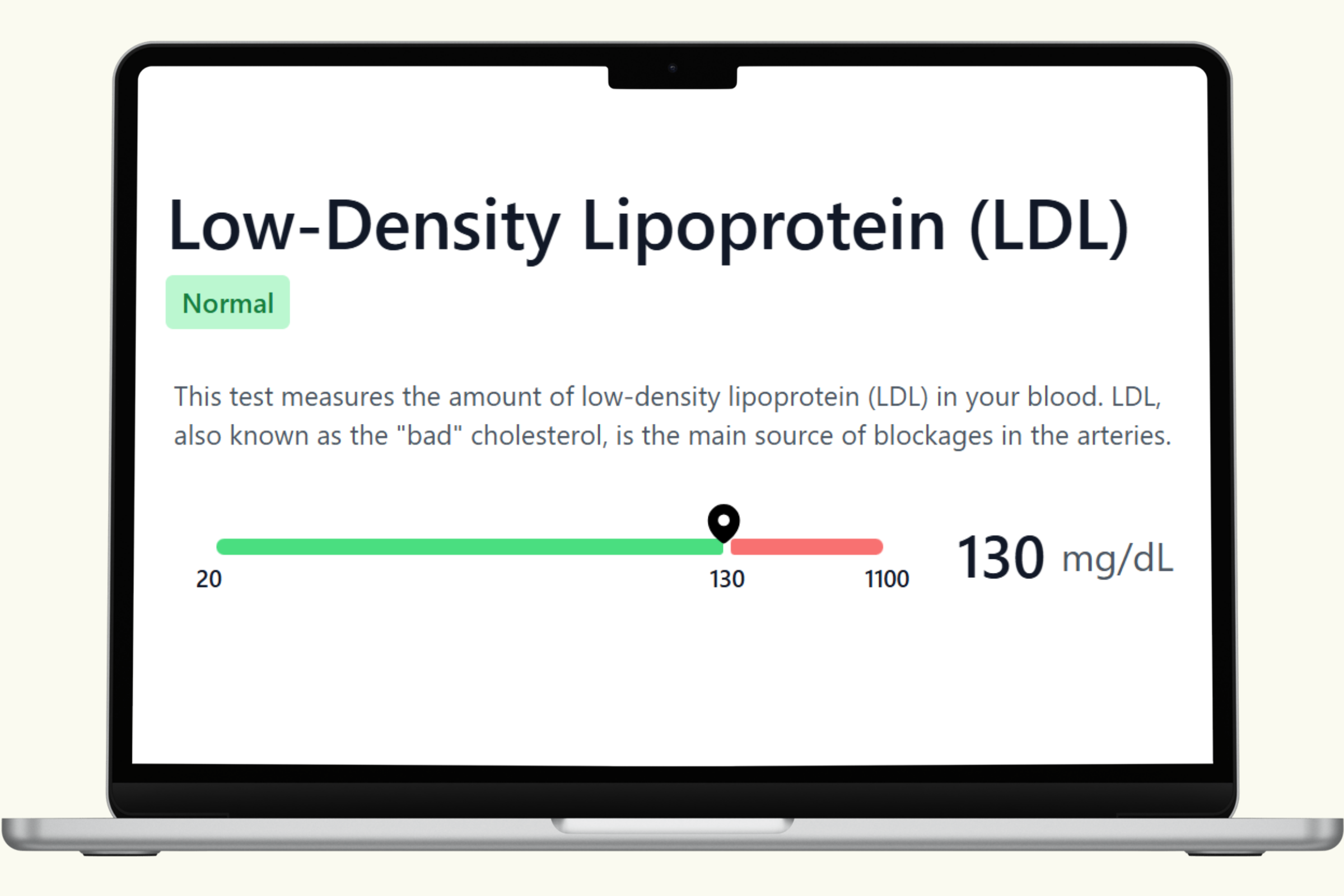LDL Cholesterol Blood Test
The LDL Cholesterol Test measures the amount of low-density lipoprotein (LDL) in your blood. Often referred to as “bad cholesterol,” LDL can deposit cholesterol into artery walls, leading to plaque buildup (atherosclerosis) and increasing the risk of heart disease, stroke, and other cardiovascular problems. While LDL plays important roles in the body—such as supporting cell membranes, hormone production, and digestion—excess levels can be harmful to long-term health.
The PlexusDx Diabetes & Heart Health Blood Test includes LDL cholesterol measurement to give you valuable insight into your cardiovascular risk profile. With at-home dried blood spot (DBS) collection using an ADX card, you can monitor your cholesterol levels without visiting a clinic, making it easier to stay proactive about your heart health.
What the LDL Cholesterol Test Measures
This test specifically evaluates LDL cholesterol, which transports cholesterol from the liver to tissues throughout the body. While this function is necessary, too much LDL increases the likelihood that cholesterol will build up in arteries, forming plaques that reduce or block blood flow.
By understanding your LDL levels, you and your healthcare provider can better assess your risk of cardiovascular disease and develop strategies for prevention or management.
Why LDL Matters
LDL cholesterol is a well-established marker of heart health. High levels of LDL are strongly linked to:
- Atherosclerosis: Plaque buildup in artery walls, narrowing blood vessels and restricting blood flow.
- Coronary artery disease: Increased risk of heart attack.
- Stroke: Higher risk of blocked arteries in the brain.
- Metabolic and lifestyle conditions: Obesity, diabetes, and poor diet often drive LDL levels upward.
While high LDL is a concern, extremely low LDL may also raise issues for some individuals, since cholesterol is a building block for hormones, vitamin D, and bile acids used in digestion.
Reference and Functional Ranges
Commonly accepted ranges for LDL cholesterol include:
- Optimal: Below 100 mg/dL
- Near Optimal: 100–129 mg/dL
- Borderline High: 130–159 mg/dL
- High: 160–189 mg/dL
- Very High: 190 mg/dL or above
In functional medicine, stricter targets may be applied for high-risk individuals, aiming for LDL below 70 mg/dL, especially for those with existing heart disease or diabetes.
How the Test is Collected
The PlexusDx Diabetes & Heart Health Blood Test uses an at-home dried blood spot (DBS) collection method with an ADX card. With just a simple finger prick, you can collect a few drops of blood at home, mail the sample to the lab, and receive accurate results. This method is:
- Convenient and private
- Clinically validated for accuracy
- Less invasive than traditional blood draws
- Ideal for repeat monitoring of cholesterol levels
Factors That Influence LDL Cholesterol
Many lifestyle, genetic, and medical factors affect LDL cholesterol levels:
- Diet: Diets high in saturated fats, trans fats, and cholesterol-rich foods can raise LDL. Plant-based foods, fiber, and omega-3 fats can help lower it.
- Exercise: Physical activity improves LDL particle size and often lowers LDL levels.
- Weight: Obesity and excess abdominal fat are strongly linked to elevated LDL.
- Smoking: Contributes to higher LDL and lower protective HDL cholesterol.
- Medical conditions: Diabetes, hypothyroidism, kidney disease, and certain liver conditions can worsen LDL levels.
- Genetics: Familial hypercholesterolemia and other inherited conditions can cause very high LDL cholesterol.
How to Improve LDL Cholesterol
Fortunately, LDL cholesterol levels are highly responsive to both lifestyle changes and medical treatments. Strategies include:
- Adopt a heart-healthy diet: Emphasize vegetables, fruits, whole grains, lean protein, and healthy fats from fish, nuts, and olive oil.
- Increase soluble fiber: Foods like oats, beans, and flaxseed bind cholesterol in the gut and help lower LDL.
- Exercise regularly: At least 150 minutes of moderate aerobic activity weekly supports healthy cholesterol balance.
- Quit smoking: Improves both LDL and HDL cholesterol.
- Lose excess weight: Even modest weight loss can reduce LDL.
- Medications: Statins, PCSK9 inhibitors, and other therapies may be prescribed when lifestyle alone is insufficient.
Why Pair LDL with Other Biomarkers?
While LDL is a key marker, it is most effective when interpreted alongside other lipid and glucose tests. The PlexusDx Diabetes & Heart Health Blood Test also includes HDL, VLDL, triglycerides, cholesterol ratios, fasting glucose, and hemoglobin A1C. Together, these biomarkers provide a complete picture of cardiovascular and metabolic health.
Take Charge of Your Heart Health
The LDL Cholesterol Test offers essential insight into one of the most important risk factors for cardiovascular disease. With PlexusDx’s at-home testing solution, you can easily measure and track your LDL levels, empowering you to take meaningful steps toward heart health. By combining your results with healthy lifestyle choices—and medical care if needed—you can lower your risk of heart attack, stroke, and long-term complications while improving your overall well-being.

Share:
HDL Blood Test
Triglycerides Blood Test